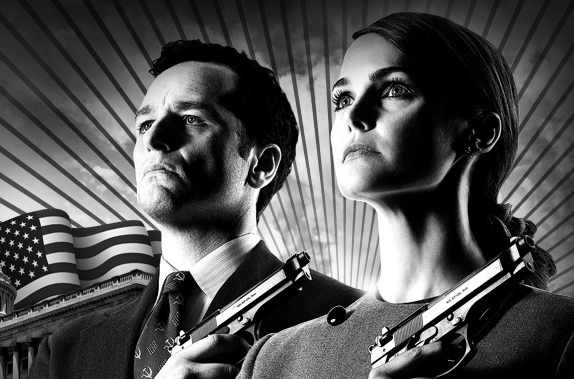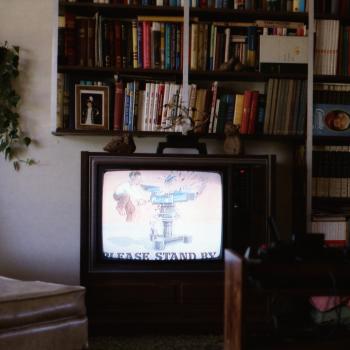 Recently I completed work on the first season of The Americans, a new FX drama about Soviet spies posing as D.C. suburbanites in the Cold War heyday of early 1980s America. My prior job was on Boss, about a ruthless Chicago mayor desperate to hide and survive at any cost an equally ruthless degenerative disease.
Recently I completed work on the first season of The Americans, a new FX drama about Soviet spies posing as D.C. suburbanites in the Cold War heyday of early 1980s America. My prior job was on Boss, about a ruthless Chicago mayor desperate to hide and survive at any cost an equally ruthless degenerative disease.
Loath as I often am to watch TV at night after a day spent creating it, I am hooked enough on Breaking Bad that ahead of its final chapter this summer I’m catching up on back seasons of the saga about a terminally ill high school chemistry teacher who puts his lab skills to use in the crystal meth business to secure the financial future of his family.
But I’m way behind on Mad Men, about a 1960s ad exec whose primary marketing campaign consists of maintaining his fabricated identity.
What gives with all the secrets that form a kind of landscaping in prime-time television?
Just when it seemed that scripted drama as a genre was in the Weeds (about a single mother who makes ends meet selling pot) due to inroads by upstart competitors in reality TV, a cable-fueled surge of quality shows has reasserted this realm as the proper Homeland (about a U.S. Marine turned covert Muslim terrorist) of the American viewing public.
On the one hand, the trend can be chalked up to the runaway success of The Sopranos, featuring a New Jersey mob boss who straddled to harrowing and hilarious effect the double entendre of terms like “family man” and “waste management.” While several networks passed on The Sopranos before HBO took it on and forever changed the landscape of television, they and all of cable have been playing catch-up ever since.
On the other hand, the dramatic device of characters with secrets is as old as literature itself. Long before the likes of Tony Soprano, Walter White, and Don Draper, there was Adam—though he seemed to have a harder time keeping things secret in the Garden than his latter-day counterparts. The FBI and DEA are one thing; YHWH is another.
There remains something curious about the central role of secrets in much of contemporary American television. We’re not just talking about a narrative ingredient in this or that episode, but a premise that undergirds entire shows.
The post-9/11 timing of the trend is curious enough, as if it were tapping into a collective paranoia about the sleeper-cell society in which we now live. Add to that a simultaneous worldwide web spun by the Internet with all its predatory effects on privacy, identity, and security, and we are a people primed to ponder how well we know others, not to mention how well they know us.
Has the cross-pollination of the War on Terror and social media illuminated a certain truth that’s been with us all along: that every one of us is a sleeper cell to varying degrees for the secrets that we carry—secrets certainly harmful to ourselves and often to others as well?
If so, then contemporary American television in spite of itself is meeting by vicarious means a deeply spiritual need to know and be known.
And you thought you were just kicking back to decompress at the end of a long day.
So have I many a night while catching up on Breaking Bad, though it’s probably clear that I might not kick back as easily as the next guy: in addition to being a content provider and consumer, I’m also a bit of an armchair semiotician when it comes to TV.
Recently I noticed a striking coincidence while making my way toward the fourth season’s explosive finale: at the same time that I’ve been watching Walter White’s desperate efforts to keep hidden those secrets he so desperately wants revealed, I was scheduled for my first confession at church.
Having grown up Episcopalian with only a middling sense of the sacraments, I married a Catholic who was attending an Anglo-Catholic parish under the Episcopal banner when we met. Ten years later we’re still at St. Paul’s in our Brooklyn neighborhood, and along the way I’ve come to a deeper appreciation of the sacraments I grew up with at a certain spiritual remove.
One I hadn’t grown up with in the ecclesiastical sense (though plenty in the personal sense) was confession. And when the Lenten invitation appeared in the church newsletter this past winter, I made an appointment with our rector—less to redress any particular sin than to acquaint myself with the rite.
After some discussion, he suggested as one possibility a general confession to be made sometime between Easter and Pentecost, by which I’d undertake an overall accounting of my more flagrant sins in life up until that point.
Long story short: that was fun.
But there was something undeniably awesome about taking stock as best I could of where, when, and how I have fallen short of the glory of God—using St. Paul’s generous definition of sin—across four decades from early childhood to early parenthood.
I didn’t know what to expect going in, whether such a reckoning in the presence of another would feel horrific, salvific, or some combination of the two. Truth be told, I experienced little of either, more a fitting sense that a proper accounting had been made, even of “all other sins I cannot now remember” for which the rite makes equal provision.
There was no screen between the rector and me, unlike the image that is conjured of the confessional. But when I sit down next to watch another episode of Breaking Bad, there will be a screen between Walter White and me.
It’s as if I can almost hear him begin afresh every time, “Have mercy on me, O God…”
Bradford Winters is a screenwriter and poet, and works for The Levinson/Fontana Company as a producer and writer in television. He lives in Brooklyn with his wife and three children.











